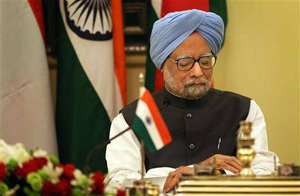
Taking what is being seen in political and bureaucratic circles as an uncharacteristically strong stand, the PMO said, "The PM is satisfied that the final decision in this regard was entirely appropriate and based on merits of the case placed before him."
The PMO statement comes after retired coal secretary P C Parakh — booked along with Birla for alleged criminal conspiracy and misconduct, and corruption - said that if CBI thought there were irregularities, then the PM ought to be "accused No 1" for giving his approval.
With the opposition baying for his resignation, Singh's move to forthrightly own up to having sought a reassessment of Hindalco's case after a representation by Odisha chief minister Naveen Patnaik appears intended to cap a politically debilitating controversy.
But by doing so, Singh, who at the time held charge of the coal ministry, accepted he was the "competent authority" who signed off on the coal allocations in the 2006-09 period - under CBI's lens — when he held charge of the portfolio. On whether the PM would be ready to be questioned in any Coalgate case, as suggested by senior minister Kamal Nath, a PMO spokesperson declined comment, saying CBI was yet to make such a request.
The PMO said it didn't wish to impede the CBI's investigation, but justified altering the screening committee's earlier decision to award the coal block in question to public sector companies Neyveli Lignite Corp (NLC) and Mahanadi Coalfields Ltd (MCL) by relying heavily on Patnaik's backing to Hindalco.
In accommodating Hindalco as the third partner in a joint venture, PM also waived a violation in guidelines to enhance the firm's share by arguing that NLC and Mahanadi were "sister PSUs" and Neyveli's share could be made good from Mahanadi's 70% allocation.
It invoked the "federal framework" to say Patnaik's views had to be accommodated, and claimed that public sector claimants had not been disadvantaged.
Countering criticism that private sector Hindalco had been favoured, PMO said the coal requirements of the two PSUs, who also sought the blocks, were protected in a separate arrangement.
Neyveli Lignite was originally allotted Talabira II coal blocks in Sambhalpur by the screening committee headed by then coal secretary P C Parakh as the panel held that Hindalco had failed to utilize a previously allocated block. The committee also said Hindalco had been provided adequate coal linkages from MLC, which it had failed to utilize. It was felt NLC and Mahanadi could together develop Talabira II and III to extract an additional 30 million tonnes of coal.
The coal ministry altered the screening committee's decision and gave Hindalco a 15% stake in a joint venture with NLC and Mahanadi, said the PMO, after considering representations from Birla and Patnaik, which were referred to it by the PM.
PMO said while the original recommendation was being processed by it, the PM received a letter dated 17.8.2005 from the Odisha CM saying that the state government assigned "topmost priority" to allocating Talabira II to Hindalco. Singh noted "please get a report from the coal ministry" on the letter.
Birla in his letter also sought the linkage and officials said he explained that Hindalco had not been able to use its previous allocation as a bauxite lease for its aluminium plant had not materialized.
Coal ministry resubmitted the file on 16.9.2005 proposing that Talabira II and III be mined as a single entity by the JV. Mahanadi's holdings would be proportionate to the extractable reserves in Talabira III or 70% of annual production.
The coal ministry told the PM that the total requirement of coal from the blocks by the main contenders was 503 million tons. The ministry said the claim of Orissa Sponge Iron Ltd would be accommodated elsewhere and Mahanadi was made a partner along with Hindalco and NLC.
Neyveli could not be dropped as it was a central PSU backed by the screening committee. In its account, PMO has leaned on the Odisha CM's "clear preference" for Hindalco in the "interest of creating more employment and growth of the state's manufacturing sector."








Comments
Add new comment